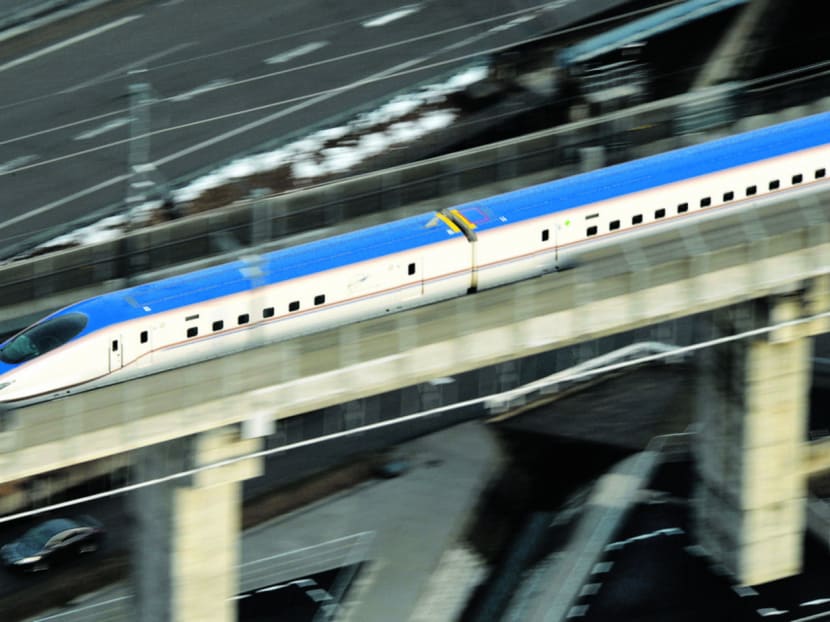Abe to pitch bullet train technology for S’pore-KL HSR link
TOKYO — Prime Minister Shinzo Abe is set to pitch Japan’s shinkansen bullet train technology to his Malaysian counterpart Najib Razak in Tokyo today for a planned Singapore-Kuala Lumpur high-speed rail link, and offer increased assistance to Malaysia’s coast guard to counter China’s growing influence in the South China Sea.
TOKYO — Prime Minister Shinzo Abe is set to pitch Japan’s shinkansen bullet train technology to his Malaysian counterpart Najib Razak in Tokyo today for a planned Singapore-Kuala Lumpur high-speed rail link, and offer increased assistance to Malaysia’s coast guard to counter China’s growing influence in the South China Sea.
Mr Najib, who is accompanied by his wife Rosmah Mansor, arrived in the Japanese capital yesterday morning for a three-day official visit that is expected to further strengthen the long-standing bilateral ties between both countries.
As part of his visit, today Mr Najib will have an audience with Emperor Akihito and Empress Michiko at the Imperial Palace, attend a round table meeting with 34 captains of industry, and hold a bilateral meeting with Mr Abe.
Mr Abe and Mr Najib are planning to issue a document that would urge countries to respect the rule of law and not to use force or coercion in asserting their territorial claims, taking aim at China’s aggressive land reclamation work in the South China Sea that Japan, the United States and others fear may undermine the freedom of navigation and overflight of the high seas, Japanese officials said.
The South China Sea, an international shipping route and an area believed to have rich energy reserves and fishing grounds, is claimed in part or in whole by China, Malaysia, the Philippines, Taiwan, Brunei and Vietnam. Japan is also embroiled in a territorial dispute with China over the Senkaku, or Diaoyu islands, in the East China Sea.
In expressing Japan’s interest in the Singapore-Kuala Lumpur high-speed rail link, Mr Abe is expected to stress the safety and advanced technology of the shinkansen as Japan promotes high-quality and innovative infrastructure exports, particularly to the fast-growing Asia with enormous infrastructure needs.
Earlier this month, Mr Najib and Singapore Prime Minister Lee Hsien Loong said the two countries decided to push back an initial deadline of 2020 for completion of the 350km high-speed rail link due to the project’s complexity. China and France are rival bidders to the rail link.
Mr Abe’s call to Malaysia — and Singapore — comes as the transport ministers of Japan and Thailand are set to agree on Wednesday in Tokyo that Thailand will consider introducing the shinkansen in a high-speed railway project between Bangkok and Chiang Mai, according to a diplomatic source.
Similarly, Japan is lobbying Indonesia to use the railway technology in a project between Jakarta and Bandung, a deal also being competed for by China. Tokyo is also pitching the shinkansen for a planned high-speed rail link between Mumbai and Ahmedabad.
“Safe and highly reliable high-speed rail systems have the power to reshape the flow of people and goods dramatically,” Mr Abe said in a speech last Thursday in Tokyo where he pledged a US$110 billion (S$147 billion), five-year infrastructure investment in Asia with the Asian Development Bank in an apparent move to counter a China-led investment bank.
Given Malaysia’s role as the Association of Southeast Asian Nations (ASEAN) chair this year, Mr Abe plans to offer support in boosting connectivity and narrowing development gaps within ASEAN as the 10-member bloc is lowering barriers to the flow of people, goods and money to launch a more integrated economic community by the end of the year, the Japanese officials said.
Mr Abe and Mr Najib are expected to agree to expand scholarships for students from ASEAN member states wishing to study at the Malaysia-Japan International Institute of Technology, a Japanese-style engineering college that opened in Kuala Lumpur in 2011.
The two leaders are also likely to affirm cooperation in the fight against terrorism, reform of the United Nations Security Council and negotiations for a 12-nation Pacific free trade initiative known as the Trans-Pacific Partnership, which both Japan and Malaysia are party to. AGENCIES










